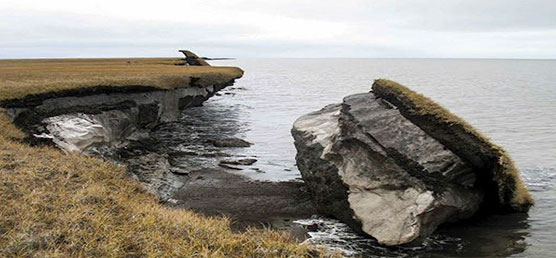
Recent Arctic erosion and loss of permafrost along the Alaskan coast near Drew Point. Thawing land ice (white) is clearly visible. This is part of the current rapid changes happening in the Arctic. Photo from USGS.
The Arctic is changing rapidly as a result of global climate change. “Over the past five years, warm Arctic temperatures and large sea-ice deficits show contemporary climate states outside of previous experience. We have already lost 75% of the sea ice volume in the Arctic since 1979”, says one of the authors of a new research paper, Research Professor Martin Forsius from the Finnish Environment Institute.
Future changes of the Arctic are projected to occur twice as fast as those further south. This will leave the Arctic a much different environment by mid-century, with less snow and sea ice, thawing permafrost and melting glacial ice, and altered ecosystems. All this is driven by an annual mean Arctic temperature increase of +4°C. These changes may in turn impact lower latitudes through tundra greenhouse gas release. changes in ocean circulation, and shifts in atmospheric jet stream patterns.
These are the conclusions reached in the paper published in the journal Polar Science. The research provides a synthesis of the latest observational trends and projections for the future. The paper was authored by a team of ten international scientists as part of the Arctic Monitoring and Assessment Programme’s (AMAP) climate group.
Furthermore, owing to time lags between rising temperatures and melting ice on Greenland, accelerating global sea-level rise will continue throughout the century, even under ambitious programmes to reduce greenhouse gas emissions.
Arctic-specific radiative and heat storage feedbacks may become an obstacle to achieving a stabilized global climate under the Paris Accord global limit of a less than +2°C increase. In light of these trends, Arctic changes call for early and ongoing adaptation and mitigation actions. Greenhouse gas emission reductions will delay rates of Arctic change, making adaptation more tractable.
More information
- The full pre-print article ‘The Urgency of Arctic Change’
- Research Professor , Finnish Environment Institute, tel +358 295 251 118, forename.surname@ymparisto.fi
Lead authors
-
James Overland, NOAA USA
james(dot)e(dot)overland@noaa.gov
-
Jason Box, Geological Survey of Denmark and Greenland
jeb(at)geus.dk